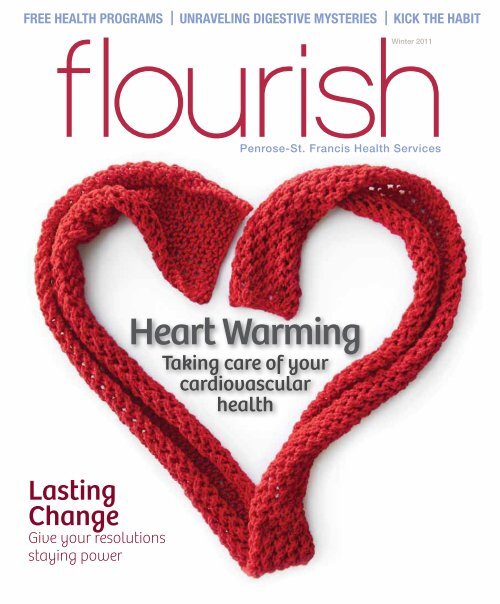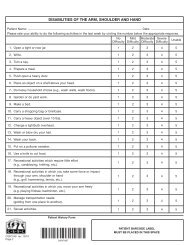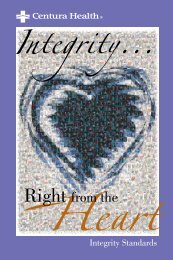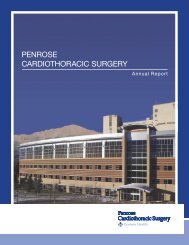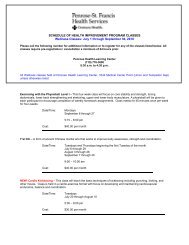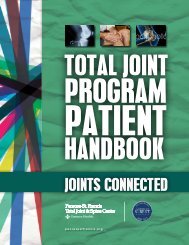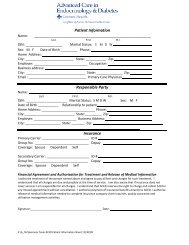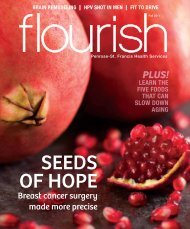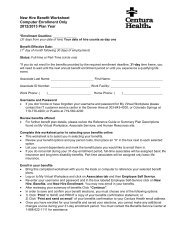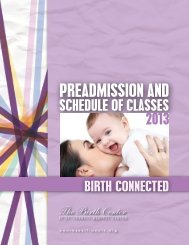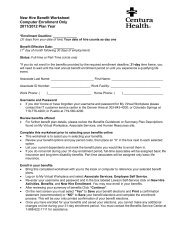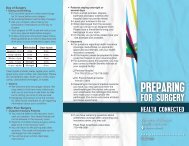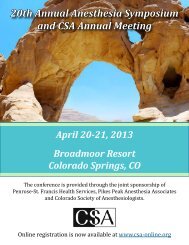Winter 2011 - Penrose-St. Francis
Winter 2011 - Penrose-St. Francis
Winter 2011 - Penrose-St. Francis
You also want an ePaper? Increase the reach of your titles
YUMPU automatically turns print PDFs into web optimized ePapers that Google loves.
FREE health programs Unraveling Digestive Mysteries Kick the Habit<br />
flourish<br />
<strong>Winter</strong> <strong>2011</strong><br />
<strong>Penrose</strong>-<strong>St</strong>. <strong>Francis</strong> Health Services<br />
Heart Warming<br />
Taking care of your<br />
cardiovascular<br />
health<br />
Lasting<br />
Change<br />
Give your resolutions<br />
staying power
healthystart<br />
Unraveling Digestive Mysteries<br />
Opening Thoughts<br />
With Chris Hildebrant RN, MSN,<br />
Director of Women’s Health<br />
Welcome to flourish, a quarterly health<br />
publication developed for the women of the<br />
Colorado Springs community.<br />
Many of you are my neighbors, my friends<br />
and my coworkers and I know you well. You<br />
lead busy lives filled with family, friends, community<br />
and work. And squeezed in between<br />
all of this, you have to find time to take care<br />
of yourself and your family—physically, mentally,<br />
spiritually and emotionally.<br />
This publication was designed with all of<br />
that in mind. Each issue, we will give you the<br />
latest health information to help you make the<br />
best decisions for your own health and that of<br />
your family.<br />
So please, grab a cup of green tea, put up<br />
your feet and read through our inaugural issue.<br />
I promise that it will be 10 minutes well spent!<br />
Flourish is published four times annually by <strong>Penrose</strong>-<strong>St</strong>.<br />
<strong>Francis</strong> Health Services. As part of Centura Health, our<br />
mission is to nurture the health of the people in our community.<br />
The information herein is meant to complement<br />
and not replace advice provided by a licensed health<br />
care professional. For comments or to unsubscribe to<br />
this publication, please email us at flourish@centura.<br />
org. Flourish is produced by Clementine Communications<br />
of Denver, Colo. Executive Editor is Jill Woodford.<br />
2222 N. Nevada Ave., Colorado Springs, CO 80907<br />
With one in every 25 people estimated to have some form of food allergy, it’s easy to think that<br />
an upset digestive tract is the result of a wheat allergy. But your symptoms could be masking a<br />
much bigger problem known as celiac disease.<br />
“A wheat allergy is actually very different than celiac disease,” says Karin Cesario, MD, a<br />
gastroenterologist with <strong>Penrose</strong>-<strong>St</strong>. <strong>Francis</strong> Health Services. “Wheat allergies often show up in<br />
childhood and can be outgrown. But celiac disease is a lifelong condition that needs treatment to<br />
avoid serious consequences.”<br />
Celiac disease is a digestive disorder that creates an adverse reaction to gluten, present in<br />
wheat, rye, barley and possibly oats. It can lead to fatigue, anemia, malabsorption of vitamins and<br />
minerals, osteoporosis and even small intestinal cancer. Although the disease is quite common—<br />
about 1 in every 133 people have it—it’s estimated that<br />
50 percent of people with the disease don’t know<br />
they have it, Cesario says.<br />
Celiac disease runs in families and<br />
people of northern European descent<br />
are at highest risk.<br />
Wheat Allergy<br />
Symptoms include<br />
hives, difficulty breathing<br />
and nausea.<br />
Celiac Disease<br />
Often has no symptoms,<br />
but can be associated<br />
with bloating and chronic<br />
diarrhea.<br />
Cut the Flu Short<br />
The flu vaccine is the best way to prevent the flu—and it’s not too late to<br />
get one. Everyone over the age of 6 months—and particularly pregnant<br />
women—should get a vaccine. If you do get the flu, taking antiviral drugs<br />
can shorten the duration of symptoms and prevent other family members<br />
from getting it. But these medicines must be used within 48 hours of<br />
the onset of symptoms to be effective, says Meredith Cassidy, MD,<br />
an obstetrician with <strong>St</strong>. <strong>Francis</strong> Medical Center. If you’re experiencing<br />
fever, aches, chills and fatigue, call your doctor right away.<br />
Photos: cover image and portrait of chris hildebrandt: ellen jaskol, Wheat: ©i<strong>St</strong>ockphoto.com/melhi, Flu ©i<strong>St</strong>ockphoto.com/AdamGregor<br />
flourish<br />
2<br />
<strong>Winter</strong> <strong>2011</strong><br />
<strong>Penrose</strong>-<strong>St</strong>. <strong>Francis</strong> Health Services
Photos: exposure: ©i<strong>St</strong>ockphoto.com/logoboom, golf ball: ©i<strong>St</strong>ockphoto.com/robynmac, portrait of toni green: ellen jaskol<br />
REDUCE<br />
your<br />
exposure<br />
The average<br />
American’s exposure<br />
to radiation, which<br />
increases the risk of<br />
cancer, has grown<br />
sixfold over the past<br />
20 years. <strong>Penrose</strong><br />
Hospital and <strong>St</strong>. <strong>Francis</strong><br />
Medical Center are the<br />
only imaging centers<br />
in southern Colorado<br />
to offer low-dose CT<br />
scans that cut radiation<br />
exposure by 40 percent.<br />
To learn more, go to<br />
penrosestfrancis.org<br />
and search on<br />
low-radiation CAT.<br />
For the Man<br />
in Your Life<br />
PSA Testing: A prostate cancer<br />
screening is a simple test, but the<br />
decision to be tested is not so simple.<br />
A screening can detect the presence of<br />
cancer, but it cannot tell whether that<br />
cancer is fast growing and should be<br />
treated. Eighty percent of men in their<br />
80s have prostate cancer, but most die<br />
with the disease—not from it, says<br />
Jeff Ferguson, MD, a urologist with<br />
<strong>Penrose</strong>-<strong>St</strong>. <strong>Francis</strong> Health Services.<br />
And treatment can result in side effects,<br />
including impotence and incontinence.<br />
Yet, one in six men die from prostate<br />
cancer. African-American men and<br />
men with a first-degree relative who<br />
was diagnosed with prostate cancer<br />
before age 75 are at highest risk. It’s<br />
not an easy decision and it’s one that<br />
is unique to each individual, Ferguson<br />
says, so get your guy to talk to his doctor<br />
about his personal risk factors.<br />
One out of every five Americans will develop colorectal cancer,<br />
making it the third most common form of cancer. Every adult<br />
should have regular colorectal screenings, beginning at age 50.<br />
While colonoscopies are considered the “gold standard” of screenings<br />
because physicians can remove pre-cancerous polyps during<br />
the screening, other less-invasive tests have proven to be just as<br />
reliable and much cheaper at detecting cancer.<br />
People over the age of 50 should discuss<br />
screening options with their physicians,<br />
says James Young, MD, an oncologist<br />
with the <strong>Penrose</strong> Cancer Center. “The<br />
key to preventing cancer is not which<br />
screening you get but being screened<br />
regularly and acting on the results,<br />
if necessary.”<br />
XOXO<br />
Comparing: Colorectal Cancer Tests<br />
For a<br />
FREE DVD<br />
on colon cancer<br />
testing, call<br />
719-776-5698.<br />
TEST FREQUENCY DESCRIPTION ADVANTAGES DISADVANTAGES<br />
Fecal Blood<br />
Test<br />
Sigmoidoscopy<br />
(also<br />
called a<br />
flexi-scope)<br />
Annually<br />
Once between<br />
ages 50-60<br />
A small stool<br />
sample is<br />
analyzed<br />
Doctors use a<br />
long, flexible<br />
tube to inspect<br />
the lower colon<br />
only<br />
Colonoscopy Every 10 years Doctors use a<br />
long, flexible<br />
tube to visually<br />
inspect the colon<br />
and remove<br />
polyps<br />
Virtual<br />
colonoscopy<br />
Do I Need Digital Mammography<br />
Digital mammography is a new technology that puts the<br />
breast image on an electronic format rather than an X-ray<br />
film, allowing radiologists to manipulate this image to get<br />
a much clearer picture. A computer system also digitally<br />
reads the scan and alerts radiologists of anything suspicious.<br />
Digital mammograms allow women to keep their records with<br />
them if they move. This new technology is appropriate for<br />
every woman, but is especially valuable for women under the<br />
age of 50 and women with dense breasts.<br />
<strong>Penrose</strong> Hospital has been designated a Breast Imaging<br />
Center of Excellence by the American College of Radiology,<br />
the only center in southern Colorado to receive this designation.<br />
To schedule a digital mammogram, please call<br />
719-776-8010 (<strong>Penrose</strong> Hospital) or 719-785-9000<br />
(<strong>St</strong>. <strong>Francis</strong> Medical Center).<br />
Every 10 years<br />
A CT or MRI<br />
scan of the<br />
bowel<br />
&<br />
Q A<br />
With Toni Green, DO<br />
Director of Breast Oncology at <strong>Penrose</strong>-<strong>St</strong>. <strong>Francis</strong> Health Services<br />
Inexpensive,<br />
can be done<br />
at home<br />
Does not require<br />
sedation;<br />
faster and less<br />
expensive than<br />
colonoscopy<br />
Helps prevent<br />
cancer by allowing<br />
doctors<br />
to remove<br />
pre-cancerous<br />
polyps<br />
Non-invasive<br />
test<br />
Follow-up testing is<br />
needed if blood is detected;<br />
does not prevent<br />
cancer<br />
Only works on lower<br />
bowel, so other screens<br />
such as fecal blood test<br />
are necessary<br />
Requires sedation;<br />
expensive<br />
Effectiveness at detecting<br />
polyps is still unclear;<br />
not covered by most<br />
insurances or Medicare<br />
<strong>Penrose</strong>-<strong>St</strong>. <strong>Francis</strong> Health Services<br />
<strong>Winter</strong> <strong>2011</strong><br />
3<br />
flourish
Heart of the Matter<br />
Knowing the risks and warning signs can help you defeat heart disease<br />
<strong>St</strong>ory by Michele Conklin • Photos by Ellen Jaskol<br />
<strong>St</strong>ephanie Hammar was 39 when she came<br />
down with what she thought was the flu. Diagnosed<br />
as “overstressed,” Hammar was never<br />
sent for a cardiac test until she collapsed and<br />
was rushed to the hospital where she had an<br />
emergency procedure to open a blocked artery.<br />
Within three years, the avid athlete and<br />
self-professed health nut was again lying in the<br />
hospital after a massive heart attack that killed<br />
half of her heart’s function.<br />
Her story, unfortunately, is one that is shared<br />
by thousands of women every day.<br />
“Many people still think of heart disease as a<br />
man’s disease,” says Keathe Hanley, RN, director<br />
of cardiovascular services at <strong>Penrose</strong>-<strong>St</strong>. <strong>Francis</strong><br />
Health Services. “Even if women know it’s a<br />
problem, they think it doesn’t apply to them.”<br />
Heart disease kills one out of every three<br />
women. It’s the leading cause of death in<br />
women, claiming five times more women than<br />
breast cancer every year.<br />
Despite those numbers, many women still<br />
don’t know the problem exists. Or they ignore it.<br />
Half of all women, for instance, say they<br />
would not call 9-1-1 if they thought they were<br />
experiencing a heart attack. Other facts about<br />
heart disease that most women don’t know:<br />
• Common heart attack symptoms in<br />
women include nausea, fatigue, and<br />
anxiety—symptoms more commonly<br />
associated with the flu.<br />
• <strong>St</strong>ress can cause a unique type of heart<br />
attack, called Takotsubo syndrome, that<br />
almost exclusively occurs in women.<br />
• Women are less likely to be correctly diagnosed<br />
with heart disease—and less likely<br />
to be correctly treated—than men.<br />
• After menopause, the protective effect of<br />
estrogen disappears and the rate of heart attacks<br />
in women quickly equals that of men.<br />
When Hammar started experiencing nausea<br />
and fatigue, heart disease never crossed her<br />
mind. She went to see her doctor when her<br />
symptoms grew worse—not once but four<br />
times—without ever being tested for heart<br />
disease. At the insistence of a friend who is a<br />
nurse, she finally tried to see a cardiologist but<br />
the referral was denied.<br />
Her heart disease was eventually found after<br />
she collapsed and was rushed to a hospital<br />
emergency room. Doctors there found that<br />
her main artery was 99 percent blocked. Two<br />
days later, they found two additional clogged<br />
arteries—and a year later, she was back in the<br />
hospital when her stent closed.<br />
“All I wanted for my 40th birthday was a<br />
clean bill of health,” says Hammar, who lives<br />
in Colorado Springs and worked as a social<br />
worker at the time. “Instead, I got a fifth stent.”<br />
Until that point, Hammar’s heart had not<br />
been damaged—thanks to a lifetime of exercise,<br />
healthy eating and not smoking. But two-anda-half<br />
years later, her luck ran out. While hiking<br />
up Pike’s Peak, she became ill and started<br />
having diarrhea. Because these are not the<br />
<strong>St</strong>ephanie Hammar<br />
with her dog Chili<br />
flourish 4 <strong>Winter</strong> <strong>2011</strong><br />
<strong>Penrose</strong>-<strong>St</strong>. <strong>Francis</strong> Health Services
Warning Signs<br />
A heart attack doesn’t always feel like a heart attack. Women can experience<br />
sharp pain in the chest, arm or back. But they are just as likely to feel symptoms<br />
more common to the flu—nausea, diarrhea, fatigue and shortness of breath.<br />
Pay particular attention if these symptoms follow several days of shortness of<br />
breath or fatigue or if you are at increased risk of heart disease. If you suspect<br />
a heart attack, don’t wait it out—call 9-1-1 immediately.<br />
Photo: heart with pulse: ©i<strong>St</strong>ockphoto.com/ emirsimsek<br />
normal symptoms of a heart attack, she once<br />
again thought she had picked up a bug. Within<br />
hours, however, she started feeling pain in her<br />
chest and back.<br />
It was five hours before Hammar reached a<br />
hospital. Once there, Hammar was in the throes<br />
of a full-blown heart attack that killed the left<br />
side of her heart. She had to quit her job and<br />
give up many of her athletic passions.<br />
“I’ve worked through my anger by speaking<br />
out,” says Hammar, now 44. Last fall, Hammar<br />
was nominated by <strong>Penrose</strong>’s cardiac rehab<br />
program and selected by WomenHeart.org to be<br />
trained as an advocate for women’s heart disease.<br />
“Eighty percent of heart disease in women<br />
is preventable, but women—and their doctors—just<br />
don’t know to look for it,” Hammar<br />
says. “Because I was an athlete and so healthy,<br />
no one ever said to get my cholesterol checked.<br />
But it turned out I have high cholesterol and it<br />
was probably building up in my arteries since<br />
my teens or 20s.”<br />
While more women than men die of heart<br />
disease each year, it still remains underdiagnosed<br />
and undertreated in women. Women<br />
are less likely than men to seek help when they<br />
have a heart attack; they are less likely to be<br />
promptly diagnosed than men; and they are less<br />
likely to receive appropriate treatment, according<br />
to the American Heart Association.<br />
“A lot of this is due to history,” Hanley says.<br />
“Until the 20th century, men were more likely<br />
to smoke, have high cholesterol and work in<br />
high-stress jobs. But women have caught up<br />
and now are equal to men.”<br />
About 30 percent of heart attack patients at<br />
<strong>Penrose</strong> are female, and the hospital is seeing<br />
women as young as 30 having heart attacks.<br />
The heart experts at <strong>Penrose</strong> encourage<br />
women to become their own advocates by following<br />
these recommendations:<br />
• Know your family history and your<br />
risk factors.<br />
• Modify risk factors that you can control,<br />
such as smoking, obesity, high cholesterol,<br />
high blood pressure, stress and lack of<br />
physical activity.<br />
• If you are at increased risk, be tested early<br />
and regularly for heart disease (see accompanying<br />
box).<br />
• If you are at risk, carry an aspirin and take<br />
it if you feel symptoms.<br />
• Call 9-1-1 at the first sign of symptoms.<br />
• If you have symptoms and go to an ER,<br />
insist on testing.<br />
HeartScarves delivers handmade,<br />
red scarves—such as the one on our<br />
cover—to women undergoing heart<br />
procedures. These scarves symbolize the lifelines<br />
of caring and support between women. To learn<br />
more, including how you can knit or crochet a<br />
scarf for a woman fighting heart disease, go to<br />
womenheart.org and search on “heartscarves.”<br />
Women’s<br />
Heart Program<br />
Learn how to manage stress and lower<br />
your risk of heart attack. Register<br />
to win a free massage and<br />
more. See page 7.<br />
Tests You Should Get<br />
To get an accurate picture of your heart<br />
health, be sure to get these tests—especially<br />
after menopause when a woman’s<br />
risk of heart disease skyrockets.<br />
Cholesterol: Beginning at age 45,<br />
women should have their cholesterol<br />
tested annually; start testing younger if you<br />
have a family history of heart disease or<br />
high cholesterol. Guidelines call for total<br />
cholesterol under 200 mg/dl, with LDL<br />
(bad cholesterol) under 100 mg/dl and HDL<br />
(good cholesterol) over 50 mg/dl.<br />
Blood pressure: Called the silent<br />
killer, high blood pressure does not cause<br />
any symptoms until it’s too late, so get<br />
tested annually beginning at age 18. Shoot<br />
for 120/80 mmHg or below.<br />
Waist size: Abdominal fat is directly<br />
linked to cardiovascular disease. Women<br />
should have a waistline smaller than 35<br />
inches and a BMI of less than 25.<br />
Blood glucose: One out of every three<br />
adult Americans with Type 2 diabetes or<br />
“pre-diabetes”—which more than doubles<br />
your chances of heart disease—don’t<br />
know they have it. Get a fasting glucose<br />
test every year after 45; start testing<br />
younger if you are overweight, have a family<br />
history of diabetes or had gestational<br />
diabetes. A fasting glucose should be<br />
under 100mg/dl.<br />
Coronary calcium scan: If you have<br />
a family history of heart disease or other<br />
risk factors, you should consider this simple<br />
CT scan that will measure the amount<br />
of plaque buildup in your arteries.<br />
EKG, echocardiogram, stress<br />
test: These tests measure the strength<br />
of the heart and are recommended only for<br />
people at risk of heart disease.<br />
<strong>Penrose</strong>-<strong>St</strong>. <strong>Francis</strong> Health Services <strong>Winter</strong> <strong>2011</strong> 5 flourish
A New You<br />
Ahead<br />
Find your way to lasting change<br />
The Path to Success<br />
Michelle Somers, a registered dietitian and health coach at<br />
<strong>Penrose</strong>-<strong>St</strong>. <strong>Francis</strong> Health Services, maps out the route to success:<br />
• Set a goal: Write it down and establish a time frame.<br />
• Make a plan: When will you exercise When will you<br />
grocery shop for healthy foods When will you pack your<br />
lunch or fix dinner<br />
• Get a coach or a partner: Support gets you through<br />
the tough times.<br />
• Take action: Continual steps, no matter how small, add up.<br />
• Celebrate success: Often—every milestone is moving<br />
in the right direction.<br />
About half of Americans make New Year’s resolutions, mostly about<br />
weight loss, exercise and quitting cigarettes.<br />
And about half of those will still be on track by summer. So who’s likely<br />
to succeed and who’s not<br />
“There’s actually a lot of science behind what sustains change,” says<br />
<strong>St</strong>eve Tucker, PhD, manager of Profile EAP, an employee assistance program<br />
in Colorado Springs. “People commit to change and then piddle out<br />
because of where their motivation comes from.”<br />
Margaret Sabin, president and CEO of <strong>Penrose</strong>-<strong>St</strong>. <strong>Francis</strong> Health<br />
Services, calls it “finding your why.” Changing your lifestyle will only be<br />
successful if you value the change and value yourself, she says.<br />
“Whenever I hear someone say they have to lose weight because<br />
their husband wants them to or their doctor told them to, I know they’re<br />
doomed,” says Sabin, a certified fitness instructor who teaches bootcamp<br />
classes at the hospital. “But when they talk to me about wanting to hike<br />
with their kids, I know they’re on to something.”<br />
Does your “why” make you feel happy and hopeful “If<br />
it’s about guilt, restrictions and feelings of inadequacy, you<br />
haven’t found your why,” Sabin says.<br />
Once you’ve found the right “why,” then success depends<br />
on a plan and mastery. Women, in particular, don’t like to<br />
feel incompetent, Tucker says. They can walk into a fitness<br />
class with good intentions, but if they feel awkward, they’re<br />
not likely to return.<br />
The need for mastery and competence holds women<br />
back in another way. Most women juggle a full life of<br />
work, family, social and community activities. They often<br />
become so good at this life that they have a hard time<br />
putting it aside for themselves, says Sheila Bee, MD, an<br />
internal medicine physician in Colorado Springs.<br />
“We almost like the stress of having to be here and<br />
there and having all these roles,” Bee says. Eventually,<br />
however, these choices take their toll—not just<br />
physically but mentally. “We can get bitter, wondering<br />
who is going to do something for us. And the<br />
truth is that no one is going to do it for us, we have<br />
to do it for ourselves.”<br />
<strong>Penrose</strong>-<strong>St</strong>. <strong>Francis</strong> Health Services<br />
Photos: tree: ©i<strong>St</strong>ockphoto.com/HKPNC, Map: ©i<strong>St</strong>ockphoto.com/filo
calendar winter<br />
Photo: ©i<strong>St</strong>ockphoto.com/merrymoonmary<br />
HEALTH CLASSES<br />
<strong>St</strong>rategies to Wellness<br />
Build and maintain a personal wellness program<br />
that makes a difference in your life and that of your<br />
family.Learn strategies to get you on a path to highlevel<br />
wellness, including tips on nutrition and weight<br />
management, stress, family, safety, and financial<br />
well-being.<br />
Date: Tuesday, January 25<br />
Time: 5:30–6:30 p.m.<br />
Location: <strong>Penrose</strong> Health Learning Center,<br />
1644 Medical Center Point<br />
Cost: $20<br />
Registration: 719-776-3600<br />
Reducing Breast Cancer Recurrence<br />
Decreasing stress and increasing quality of life<br />
reduces the risk of cancer recurrence and death in<br />
breast cancer patients, according to a recent study.<br />
This program will help women learn more about<br />
the relationship between stress, exercise, diet and<br />
survivorship.<br />
Date: Days vary, with program running from<br />
February 1–April 19<br />
Time: 5:30–7:30 p.m.<br />
Location: <strong>Penrose</strong> Cancer Center Conference Rooms<br />
Cost: FREE<br />
Registration: 719-776-5311<br />
Spirituality as Good Medicine<br />
More and more people are paying attention to<br />
spirituality and its relationship to healing. There is<br />
much discussion about the role of spirituality and<br />
existentialism and their relationship to disease<br />
development. Come join in the discussion of this<br />
fascinating subject.<br />
Date: Wednesday, February 9<br />
Time: 5:30–6:30 p.m.<br />
Location: <strong>Penrose</strong> Health Learning Center,<br />
1644 Medical Center Point<br />
Cost: $5<br />
Registration: 719-776-3600<br />
Additional year-round<br />
activities include:<br />
• Yoga<br />
• Power Up!<br />
• Body Toning<br />
• Bootcamp<br />
• Zumba<br />
• Tai Chi<br />
• Aquatic Classes<br />
FEATURED PROGRAM<br />
Pamper Your Heart:<br />
<strong>St</strong>ress Less Workshop<br />
Join us for a special evening that will restore your<br />
energy and your emotions while improving your<br />
health. Learn how to use visualization, breathing,<br />
positive thoughts, exercise and nutrition to cope with<br />
life’s challenges. Through this hands-on workshop,<br />
you’ll learn how to de-stress your life and lower<br />
your risk for heart disease, high blood pressure and<br />
irregular heartbeats. Delicious, heart-healthy snacks<br />
will be provided.<br />
Register to win our R&R Basket, which includes<br />
a free massage, a month of free yoga at<br />
the <strong>Penrose</strong> Health Learning Center and other<br />
stress-reducing goodies!<br />
Date: Wednesday, February 16<br />
Time: 6–8 p.m.<br />
Location: Julie <strong>Penrose</strong> Health Education &<br />
Research Center at the NorthCare Building,<br />
6071 E. Woodmen Road.<br />
Cost: FREE!<br />
Registration: 719-776-5052<br />
FITNESS CLASSES<br />
Bootcamp<br />
Join Margaret Sabin, <strong>Penrose</strong>-<strong>St</strong>. <strong>Francis</strong> Health<br />
Services CEO, and ACE certified fitness instructor, for<br />
this ultimate workout! Get your weekly mega-dose<br />
of cardiovascular conditioning, muscle toning, balance,<br />
agility training and flexibility. You are guaranteed<br />
to burn fat, manufacture energy and feel great.<br />
Date: Session 2 runs five Saturdays,<br />
February 19–March 19<br />
Time: 9–10:30 a.m.<br />
Location: <strong>Penrose</strong> Hospital Wellness Center, 2222<br />
N. Nevada Ave. East Tower, Basement Level<br />
Cost: PSF employees: $35<br />
PSF volunteers: $40<br />
Community members : $45<br />
Registration: 719-776-3600. If you register less<br />
than 24 hours before the session begins, there will<br />
be an extra $5 charge.<br />
Zumba<br />
Zumba fuses Latin rhythms and easy-to-follow<br />
moves to create a one-of-a-kind fitness program<br />
that will blow you away while burning fat. The<br />
routines feature interval training sessions combining<br />
fast and slow rhythms and resistance training. All<br />
fitness levels welcome!<br />
Date: Session 2 runs six Tuesdays,<br />
February 22–April 5 (skipping March 1)<br />
Time: 4:15–4:55 p.m.<br />
Location: <strong>Penrose</strong> Hospital Wellness Center, 2222<br />
N. Nevada Ave. East Tower, Basement Level<br />
Cost: PSF employees: $25<br />
PSF volunteers: $30<br />
Community members: $35<br />
Registration: 719-776-3600. If you register less<br />
than 24 hours before the session begins, there will<br />
be an extra $5 charge.<br />
Family CLASSES<br />
Support Group for New Moms<br />
The birth of a baby can be wonderful, difficult, happy,<br />
lonely, exhausting and fulfilling—all at the same<br />
time. Join other women with new babies to share<br />
joys, concerns and learnings. Topics include recovering<br />
emotionally and physically from pregnancy and<br />
birth, adjusting to motherhood, discovering your<br />
mothering style and more. Dress comfortably and<br />
bring your baby.<br />
Date: First four Tuesdays of every month<br />
Time: 11:30 a.m.–12:30 p.m.<br />
Location: <strong>St</strong>. <strong>Francis</strong> Medical Center (room assignment<br />
will be given at time of registration)<br />
Cost: FREE<br />
Registration: 719-571-3101<br />
Infant Massage<br />
In this two-part class, you will learn strokes that will<br />
relax your baby, encourage restful sleep and help<br />
relieve symptoms of stress and colic. Baby should<br />
be at least three weeks old when class begins.<br />
Dates: First and second Tuesdays of each month<br />
Time: 10–11 a.m.<br />
Location: <strong>St</strong>. <strong>Francis</strong> Medical Center<br />
Cost: $30 (for one or both parents)<br />
Registration: 719-571-3101<br />
Additional classes in parenting, childbirth, breastfeeding,<br />
infant CPR and many others are offered<br />
through The Birth Center at <strong>St</strong>. <strong>Francis</strong> Medical<br />
Center. For a full list and calendar, please go to<br />
penrosestfrancis.org/birth.<br />
Visit penrosestfrancis.org/wellness for a list of additional classes and events.<br />
<strong>Penrose</strong>-<strong>St</strong>. <strong>Francis</strong> Health Services <strong>Winter</strong> <strong>2011</strong> 7 flourish
2. After 2 weeks to 3 months: Circulation and lung<br />
function increase.<br />
Up Your Odds of Quitting<br />
If you’re trying to stop smoking, joining a smoking<br />
cessation program can double or even<br />
triple your chances of success, according<br />
to the National Institutes of Health. “Joining a<br />
support group gives people tools to quit smoking,”<br />
says Emmele Nicholas, LSW, smoking cessation<br />
counselor at <strong>Penrose</strong>-<strong>St</strong>. <strong>Francis</strong> Health Services. “It<br />
also provides them with support and makes them accountable.”<br />
<strong>Penrose</strong> Cancer Center offers a four-week education program,<br />
Fresh <strong>St</strong>art, to help people stop smoking. Individual<br />
counseling also is available as well as a weekly support<br />
group that meets on Wednesdays from 4–5 p.m.<br />
All programs are free and open to <strong>Penrose</strong> patients,<br />
families and employees. For more information,<br />
call Emmele Nicholas at 719-776-6048.<br />
Catholic Health Initiatives Colorado<br />
2222 North Nevada Avenue<br />
Colorado Springs, CO 80907<br />
Non-Profit Org.<br />
U.S. Postage<br />
PAID<br />
Colorado Springs, CO<br />
Permit No. 14<br />
benefits<br />
of a smoke-free life:<br />
61. After 20 minutes: Heart rate and blood pressure drops.<br />
3. After 1 to 9 months: Cilia regain normal function in<br />
lungs, reducing risk of colds, viruses and other infections.<br />
4. After 1 year: Excess risk of heart disease is cut in half.<br />
5. After 5 to 15 years: <strong>St</strong>roke risk returns to normal.<br />
6. After 10 years: Lung cancer death rate is cut in half.<br />
Get the latest health news, tips and information<br />
on health events by becoming a fan.<br />
Facebook.com/penrosestfrancis<br />
Conversations with Women<br />
Be strong against osteoporosis.<br />
Half of all women will suffer an osteoporosis-related fracture—often much younger than anticipated! But there are things you can do to prevent this shattering<br />
disease. Join our panel of experts to learn how to prevent osteoporosis with nutrition and exercise as well as understand the risks and benefits of medications and<br />
treatment options. You’ll also learn about medical conditions and medicines that can cause bone loss and the best prevention and treatment options for your body.<br />
Get a free DEXA heel scan from PENRAD Imaging and enjoy<br />
osteoporosis-fighting foods!<br />
Date: Wednesday, March 16<br />
Time: FREE DEXA heel scans start at 5 p.m. Program runs 6–8 p.m.<br />
Location: Julie <strong>Penrose</strong> Health Education and Research Center<br />
(NorthCare Building on the <strong>St</strong>. <strong>Francis</strong> Medical Center campus), 6071 E. Woodmen Road.<br />
Cost: FREE<br />
To register for this FREE program and to get your<br />
free bone density heel scan, call 719-776-5052.<br />
Photos: Women: ©i<strong>St</strong>ockphoto.com/H-Gall, note: ©i<strong>St</strong>ockphoto.com/loops7, pin: ©i<strong>St</strong>ockphoto.com/zentilia<br />
Centura Health complies with the Civil Rights Act of 1964 and Section 504 of the Rehabilitation Act of 1973, and no person shall be excluded from participation in, be denied benefits of, or otherwise be<br />
subjected to discrimination in the provision of any care or service on the grounds of race, religion, color, sex, national origin, sexual preference, ancestry, age, familial status, disability or handicap.


